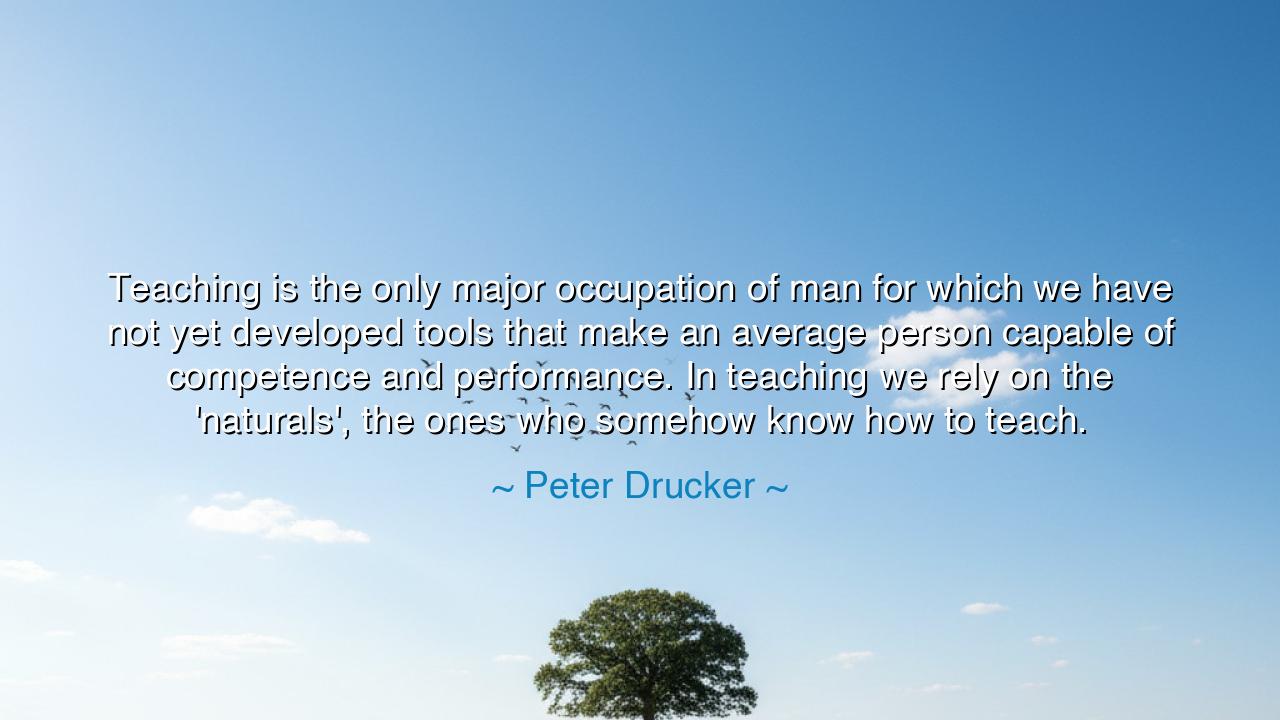
Teaching is the only major occupation of man for which we have
Teaching is the only major occupation of man for which we have not yet developed tools that make an average person capable of competence and performance. In teaching we rely on the 'naturals', the ones who somehow know how to teach.






Hear now the words of Peter Drucker, sage of management and keen observer of human endeavor: “Teaching is the only major occupation of man for which we have not yet developed tools that make an average person capable of competence and performance. In teaching we rely on the naturals, the ones who somehow know how to teach.” These words reveal a truth both humbling and urgent, for they uncover the mystery of why so many try to teach, yet so few truly awaken the hearts of learners.
In every great human pursuit, we have forged instruments to lift the ordinary into mastery. The farmer has the plow, the builder the hammer, the sailor the compass. Even in healing, the physician is aided by medicines and machines. Yet in the art of teaching, no such tool exists to guarantee competence. The teacher stands naked before the minds of the young, armed not with devices, but with spirit, with imagination, with patience. Thus, Drucker reminds us that the great teacher cannot be manufactured; he must be born, or forged in the fires of passion.
Consider the example of Confucius, who wandered the roads of China with little more than words and presence. He carried no instruments of trade, no armies of assistants, no manuals of easy method. Yet men followed him by the thousands, for his wisdom flowed like water, clear and life-giving. He was a natural, a man who embodied teaching in every word, every gesture, every silence. No tool could have given him what he possessed: the soul of a teacher.
History also teaches us through its failures. In many empires, rulers tried to reduce teaching to a rigid system, binding it with strict doctrines, mechanical drills, and lifeless repetition. They believed that with enough structure, even mediocrity could pass for learning. But the result was often stagnation. Students became obedient parrots, not thinkers. This is what Drucker warns against: that without the fire of the naturals, without those who can inspire rather than merely instruct, true performance in teaching withers.
And yet, this truth is not cause for despair, but for reverence. For if teaching resists mechanization, it means it remains among the highest callings, an art closer to prophecy than to craft. The natural teacher is rare because he carries something divine: the ability to breathe life into dry bones, to kindle flames where there was only ash. He cannot be replaced by machine or formula, for what he transmits is not only knowledge, but spirit.
The meaning, then, is clear: we must honor those rare naturals, but we must also strive to awaken the teacher within ourselves. For while tools may never guarantee competence, the virtues of humility, curiosity, patience, and love of truth can bring us closer to that calling. The true teacher does not rely on tools, but on the cultivation of the heart.
So, what lesson remains for you, listener? It is this: never take lightly the gift of a teacher who inspires. Seek them, honor them, and remember them, for they shape destinies. And if life calls you to teach—even in small ways, to a child, a friend, a colleague—do not despair that you are not a “natural.” Instead, practice the virtues of listening, of kindness, of clarity. Give yourself wholly to the moment of sharing wisdom. For every act of teaching, however small, is a step toward greatness.
Thus, remember Drucker’s truth: teaching is not built upon tools, but upon the soul. It is the one human task where the power of the heart outweighs all instruments of craft. If you are called to it, walk boldly, for though tools may fail, the flame of a true teacher endures for generations.






AAdministratorAdministrator
Welcome, honored guests. Please leave a comment, we will respond soon